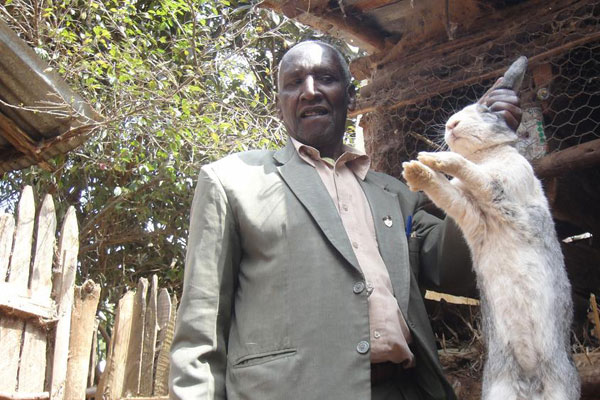For more than 800,000 small-scale farmers in Rift Valley, proceeds from commercial maize production has contracted in recent years.
Maize prices are low, and the devastating effects of Maize Lethal Necrosis disease has affected thousands of hectares of farmlands. But instead of dumping maize for better paying cash crops, Mr Samuel Macharia has found a new way of earning his bread and butter. Rearing of high yielding rabbits is his catch.
The project, he says, is a low-cost investment compared to maize farming. From making an average of Sh90,000 from the sale of maize from his three acres every harvest, Mr Macharia — a small-scale farmer in Kuresoi North, Nakuru County — has made over Sh350,000 from just 35 rabbits, which he started with in December 2013.
With maize, the farmer used to budget about Sh30,000 for farm inputs for each acre. The labour was intensive and the management equally tough. And with the present threat of the deadly lethal disease, the wait for a bumper harvest, he says, is always uncertain for a small-scale farmer.
“I have seen a farmer in this area (Kuresoi North), whose whole maize plantation has been destroyed by the disease. It is such a big loss,” says Mr Macharia.
“Imagine a farmer, who solely depends on maize for subsistence and commercial use then the disease just destroys everything. What will the children eat and how are they supposed to go to school?” Said the small-scale farmer.
It only takes a maximum of Sh500 a month for Mr Macharia to feed his rabbits, which he sells to butchers in Nakuru town. He has a range of varieties including chinchilla, New Zealand white, Black Dutch, Kenya White and French Ear-Lopes. “Rabbits do not require much attention like maize. They can feed on the locally available vegetation and once in a week treat them with fish fillets,” he says.
“I am much concerned with cold and the Newcastle disease because it really affects them,” he adds. But to avoid any losses, he regularly gives them a dose of traditional herbs, which he says is very effective.
The idea for rearing the pearl shaped white meat providers did not just prop up with the disappointing yields from maize production. Mr Macharia is one the 12,000 small holder farmers in Nakuru, who have received extensive training on agricultural diversification and adaption to climate change from the ministry of Agriculture in collaboration with local non-governmental organisations.
His association with officials from the Agriculture ministry has exposed him to a lot of information on improving farm production and increasing household income.
“I received a lot of training on agribusiness through the ministry of Agriculture in collaboration with a local NGO, Sustainable Practical Program for Africa, and I learnt how to make profits from rabbits rather than stick to maize, whose production has not been good in recent years,” he says.
At the moment, he can breed over 1,000 kittens in a year, which he sells at Sh35 for a kilogramme of the live rabbit and Sh350 for a equal weight of meat. “One rabbit can give birth to eight kittens. Their gestation period is just a month. In a year, one rabbit gives birth six times,” he notes.
The mature rabbits he supplies to the local hotels weigh an average of three kilogrammes. “It all depends on how you feed your rabbits and protect them from any danger. Just like a human being, they need a conducive environment to do well,” he advises.
GREAT POTENTIAL
Mr Macharia has built pens for the rabbits. The iron-roofed shelter is also water proof to protect them from the elements. From his proceeds, Mr Macharia has expanded to greenhouse farming where he grows tomatoes. “I now grow maize for home use. It relieves me the stress to know that if attacked with the lethal disease, I have something else to turn to unlike before,” he notes.
He calls on the ministry of Agriculture to reach out to more farmers with necessary information on diversifying food production and adapting to changing production cycles as the impacts of climate change manifest themselves through falling production. “For maize, you have to wait for a year and these days you can neither predict the weather pattern nor how much you expect to harvest,” he notes.
The farmer says majority of the small-scale farmers in the rural areas across Kenya have the potential to increase their production if provided with the right information.
“There is a great deal for agricultural officers to go out to the rural farmers and teach them on the modern ways of farming in order to save them from hunger and poverty,” he says.
Already, over 12,000 small-scale farmers in Nakuru County have formed an association to take advantage of training opportunities besides access to credit. Mr Macharia is a member and is already receiving famers in his homestead for training on agribusiness.









